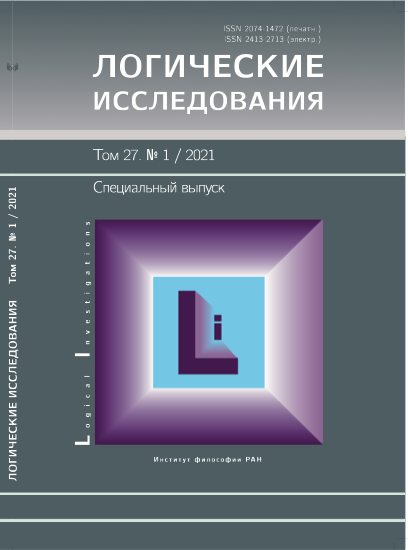A Conflict Tolerant Logic of Explicit Evidence
Main Article Content
Аннотация
Standard epistemic modal logic is unable to adequately deal with the FrauchigerRenner paradox in quantum physics. We introduce a novel justification logic CTJ, in which the paradox can be formalized without leading to an inconsistency. Still CTJ is strong enough to model traditional epistemic reasoning. Our logic tolerates two different pieces of evidence such that one piece justifies a proposition and the other piece justifies the negation of that proposition. However, our logic disallows one piece of evidence to justify both a proposition and its negation. We present syntax and semantics for CTJ and discuss its basic properties. Then we give an example of epistemic reasoning in CTJ that illustrates how the different principles of CTJ interact. We continue with the formalization of the Frauchiger–Renner thought experiment and discuss it in detail. Further, we add a trust axiom to CTJ and again discuss epistemic reasoning and the paradox in this extended setting.
Скачивания
Article Details
Литература
Artemov, 2001 – Artemov, S. “Explicit provability and constructive semantics”, Bulletin of Symbolic Logic, 2001, Vol. 7, No. 1, pp. 1–36.
Artemov, 2006 – Artemov, S.N. “Justified common knowledge”, TCS, 2006, Vol. 357, No. 1–3, pp. 4–22.
Artemov, 2008 – Artemov, S.N. “The logic of justification”, RSL, 2008, Vol. 1, No. 4, pp. 477–513.
Artemov, Fitting, 2019 – Artemov, S. and Fitting, M. Justification Logic: Reasoning with Reasons. Cambridge University Press, 2019.
Brezhnev, Kuznets, 2006 – Brezhnev, V.N. and Kuznets, R. “Making knowledge explicit: How hard it is”, TCS, 2006, Vol. 357, No. 1–3, pp. 23–34.
Bucheli et al., 2011 – Bucheli, S., Kuznets, R. and Studer, T. “Justifications for common knowledge”, Applied Non-Classical Logics, 2011, Vol. 21, No. 1, pp. 35–60.
Bucheli et al., 2014 – Bucheli, S., Kuznets, R. and Studer, T. “Realizing public announcements by justifications”, Journal of Computer and System Sciences, 2014, Vol. 80, No. 6, pp. 1046–1066.
Chellas, 1980 – Chellas, B.F. Modal Logic. An Introduction. Cambridge University Press, Cambridge, 1980.
Faroldi et al., 2020 – Faroldi, F., Ghari, M., Lehmann, E. and Studer, T. “Impossible and conflicting obligations in justification logic”, in: Proceedings of DEON 2020, A. Marra, F. Liu, P. Portner, and F. Van De Putte (eds.), 2020.
Faroldi, Protopopescu, 2019 – Faroldi, F.L.G. and Protopopescu, T. “A hyperintensional logical framework for deontic reasons”, Logic Journal of the IGPL, 2019, Vol. 27, pp. 411–433.
Fitting, 2005 – Fitting, M. “The logic of proofs, semantically”, APAL, 2005, Vol. 132, No. 1, pp. 1–25.
Fitting, 2016 – Fitting, M. “Modal logics, justification logics, and realization”, Annals of Pure and Applied Logic, 2016, Vol. 167, No. 8, pp. 615–648.
Frauchiger, Renner, 2018 – Frauchiger, D. and Renner, R. “Quantum theory cannot consistently describe the use of itself”, Nature Communications 9, 2018, article number 3711.
Kuznets, Studer, 2012 – Kuznets, R. and Studer, T. “Justifications, ontology, and conservativity”, in: Advances in Modal Logic, Volume 9, T. Bolander, T. Bra¨uner, S. Ghilardi, and L. Moss (eds.). College Publications, 2012, pp. 437–458.
Kuznets, Studer, 2016 – Kuznets, R. and Studer, T. “Weak arithmetical interpretations for the Logic of Proofs”, Logic Journal of IGPL, 2016, Vol. 24, No. 3, pp. 4243–440.
Kuznets, Studer, 2019 – Kuznets, R. and Studer, T. Logics of Proofs and Justifications. College Publications, 2019.
Lazarovici, Hubert, 2019 – Lazarovici, D. and Hubert, M. “How quantum mechanics can consistently describe the use of itself”, Scientific Reports 9, 2019, article number 470.
Lehmann, Studer, 2019 – Lehmann, E. and Studer, T. “Subset models for justification logic”, in: R. Iemhoff, M. Moortgat, and R. de Queiroz (eds.), Logic, Language, Information, and Computation – WoLLIC 2019. Springer, 2019, pp. 433–449. Lehmann, Studer, 2020 – Lehmann, E. and Studer, T. “Belief expansion in subset models”, in: Proceedings of Logical Foundations of Computer Science LFCS’20. Springer, 2020, pp. 85–97.
Nurgalieva, del Rio, 2019 – Nurgalieva, N. and del Rio, L. “Inadequacy of modal logic in quantum settings”, in: Proceedings 15th International Conference on Quantum Physics and Logic, QPL 2018, Halifax, Canada, 3–7th June 2018., volume 287 of EPTCS. P. Selinger and G. Chiribella (eds.). 2019, pp. 267–297.
Pacuit, Yang, 2016 – Pacuit, E. and Yang, F. “Dependence and independence in social choice: Arrow’s theorem”, in: S. Abramsky, J. Kontinen, J. V¨a¨an¨anen, and H. Vollmer, (eds.), Dependence Logic: Theory and Applications. Springer, 2016, pp. 235–260.
Schroeter, 2019 – Schroeter, L. “Two-Dimensional Semantics”, in: E. N. Zalta, (ed.), The Stanford Encyclopedia of Philosophy. Metaphysics Research Lab, Stanford University, 2019.
Studer, 2013 – Studer, T. “Decidability for some justification logics with negative introspection”, JSL, 2013, Vol. 78, No. 2, pp. 388–402.
Studer, 2020 – Studer, T. “No-go theorems for data privacy”, in: Proceedings of the 7th International Cryptology and Information Security Conference 2020, 2020, pp. 74–84.
Studer, Werner, 2014 – Studer, T. and Werner, J. “Censors for boolean description logic”, Transactions on Data Privacy, 2014, Vol. 7, pp. 223–252.
Yavorskaya, 2007 – Yavorskaya (Sidon),T. “Interacting explicit evidence systems”, Theory of Computing Systems, 2008, Vol. 43, No. 2, pp. 272–293. Published online October 2007.
